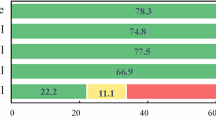Abstract
This paper aims to explore the COVID-19 epidemic information needs and information seeking behavior of overseas Chinese students. The questionnaire survey method was adopted to collect data. The results show that personal health protection knowledge, Chinese and foreign governments’ countermeasures, control effects and future plans were the most important information needs of overseas Chinese students. The information need, quality of information sources, information source accessibility and satisfaction of information source update rate have significantly positive effects on information seeking frequency. The relationship between information needs and information seeking frequency is positively moderated by both quality of information source and satisfaction of information source update rate. On the basis of these results, this paper makes suggestions for health information services to overseas Chinese students.
Access this chapter
Tax calculation will be finalised at checkout
Purchases are for personal use only
Similar content being viewed by others
References
World Health Organization. https://www.who.int/news-room/detail/30-01-2020-statement-on-the-second-meeting-of-the-international-health-regulations-(2005)-emergency-committee-regarding-the-outbreak-of-novel-coronavirus-(2019-ncov). Accessed 20 Apr 2020
Fodness, D., Murray, B.: A model of tourist information search behavior. J. Travel Res. 37(3), 220–230 (1999). https://doi.org/10.1177/004728759903700302
Li, D.J.: How Chinese consumers look for commercial information: the case of Tianjin. Nankai J. 1(2), 30–35 (2001). https://doi.org/10.3969/j.issn.1001-4667.2001.02.005
Wilson, T.D.: On user studies and information needs. J. Document. 37(1), 3–15 (1981)
Le, H.T., Nguyen, D.N., Beydoun, A.S., Le, X.T.T., Nguyen, T.T., Pham, Q.T., et al.: Demand for health information on COVID-19 among Vietnamese. Int. J. Environ. Res. Public Health 17(12), 4377 (2020). https://doi.org/10.3390/ijerph17124377
Majid, S., Rahmat, N.A.: Information needs and seeking behavior during the H1N1 virus outbreak. J. Inf. Sci. Theory Pract. 1(1), 42–53 (2013). https://doi.org/10.1633/JISTaP.2013.1.1.3
Randle, J., Nelder, M., Sider, D., Hohenadel, K.: Characterizing the health and information-seeking behaviours of Ontarians in response to the Zika virus outbreak. Can. J. Public Health 109(1), 99–107 (2018). https://doi.org/10.17269/s41997-018-0026-9
Qiao, H.: Information Behavior, 2nd edn. Beijing Normal University Publishing House, Beijing (2010)
Auster, E., Choo, C.W.: Environmental scanning by CEOs in two Canadian industries. J. Am. Soc. Inf. Sci. 44(4), 194–203 (1993). https://doi.org/10.1002/(SICI)1097-4571(199305)44:43.0.CO;2-1
Klapp, O.E.: Overload and Boredom: Essays on the Quality of Life in the Information Society. Greenwood Publishing Group Inc, Westport (1986). https://doi.org/10.2307/4308131
Zhang, Y., Sun, Y., Xie, B.: Quality of health information for consumers on the web: a systematic review of indicators, criteria, tools, and evaluation results. J. Am. Soc. Inf. Sci. 66(10), 2071–2084 (2015). https://doi.org/10.1002/asi.23311
Beltrán, C., Sánchez, S., Gómez, S., Duque, C., Sukkarie, S., Sukkarieh, L.: Update on sources of health education in pregnant women. Rev Paraninfo Digit 12, 1–7 (2011)
Carolan, M.: Health literacy and the information needs and dilemmas of first-time mothers over 35 years. J. Clin. Nurs. 16(6), 1162–1172 (2007). https://doi.org/10.1111/j.1365-2702.2007.01600.x
Macario, E., Ednacot, E.M., Ullberg, L., Reichel, J.: The changing face and rapid pace of public health communication. J. Commun. Healthcare 4(2), 145–150 (2011). https://doi.org/10.1179/175380611X13022552566254
Devaraj, S., Fan, M., Kohli, R.: Antecedents of B2C channel satisfaction and preference: validating e-commerce metrics. Inf. Syst. Res. 13(3), 316–333 (2002). https://doi.org/10.1287/isre.13.3.316.77
Li, J.: Study on the discrepancies between the perception of information quality and the use of information sources. J. Inf. Resources Manage. 4(4), 17–23,68 (2014). https://doi.org/10.13365/j.jirm.2014.04.017
Zha, X.J., Zhang, J.C., Yan, Y.L.: Impacting factors of users’ academic information seeking behavior in the context of microblogs: a dual-route perspective of information quality and information source credibility. J. Library Sci. China 41(217), 71–85 (2015). https://doi.org/10.13530/j.cnki.jlis.150015
Moore, C.N.: Mooers’ Law or why some retrieval systems are used and others are not. Bull. Am. Soc. Inf. Sci. Technol. 23(1), 22–23 (1996). https://doi.org/10.1002/bult.37
Jin, Y.L., Jiang, M.M., Chen, Y., Zhu, L.J., Fang, Z.M., Wu, N., et al.: Association of acquisition path of epidemic information with psychological problems during period of novel coronavirus disease 2019 epidemic among community residents in Anhui province. Chinese J. Public Health 36(5), 665–667 (2020). https://doi.org/10.11847/zgggws1128505
Li, Y.L., Yan, X.M.: College students’ information seeking behavior during job hunting: selection and use of information sources. Document. Inf. Knowl. 5, 57–65 (2015). https://doi.org/CNKI:SUN:TSQC.0.2015-05-008
Xie, B., Wang, M., Feldman, R., Zhou, L.: Internet use frequency and patient-centered care: measuring patient preferences for participation using the health information wants questionnaire. J. Med. Internet Res. 15(7), e132 (2013). https://doi.org/10.2196/jmir.2615
Yitzhaki, M., Hammershlag, G.: Accessibility and use of information sources among computer scientists and software engineers in Israel: academy versus industry. J. Am. Soc. Inform. Sci. Technol. 55(9), 832–842 (2004). https://doi.org/10.1002/asi.20026
Boyd, B.K., Fulk, J.: Executive scanning and perceived uncertainty: a multidimensional model. J. Manage. 22(1), 1–21 (1996). https://doi.org/10.1016/S0149-2063(96)90010-0
Dong, X.Y., Yan, F., Liu, Q.Q., Zhang, J.N.: Perceived environmental uncertainty and environmental scanning of executives in China: an empirical study. Manage. World 6, 127–135 (2008). https://doi.org/10.1201/9781420009521.ch3
May, R.C., Stewart Jr., W.H., Sweo, R.: Environmental scanning behavior in a transitional economy: evidence from Russia. Acad. Manag. J. 43(3), 403–427 (2000)
Aiken, L.S., West, S.G., Reno, R.R.:Multiple Regression: Testing and Interpreting Interactions. SAGE Publications, New Delhi (1991). https://doi.org/10.2307/2583960
Cohen, J., Cohen, P., West, S.G., Aiken, L.S.: Applied Multiple Regression/Correlation Analysis for the Behavioral Sciences, 2nd edn. Earlbaum, Hillsdale (1983)
Author information
Authors and Affiliations
Corresponding author
Editor information
Editors and Affiliations
Rights and permissions
Copyright information
© 2021 Springer Nature Switzerland AG
About this paper
Cite this paper
Wang, L., Ma, Z., Jiang, Y. (2021). COVID-19 Epidemic Information Needs and Information Seeking Behavior of Overseas Chinese Students. In: Toeppe, K., Yan, H., Chu, S.K.W. (eds) Diversity, Divergence, Dialogue. iConference 2021. Lecture Notes in Computer Science(), vol 12646. Springer, Cham. https://doi.org/10.1007/978-3-030-71305-8_3
Download citation
DOI: https://doi.org/10.1007/978-3-030-71305-8_3
Published:
Publisher Name: Springer, Cham
Print ISBN: 978-3-030-71304-1
Online ISBN: 978-3-030-71305-8
eBook Packages: Computer ScienceComputer Science (R0)




